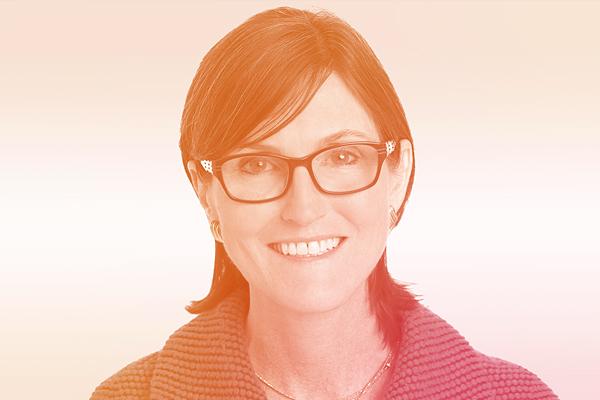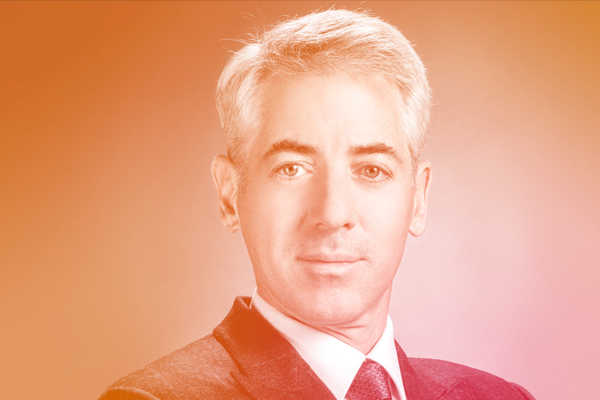
Wall Street legend Bill Ackman says megacap stocks such as Starbucks will come out of COVID-19 with a bigger moat and a market dominance like never before, and no election outcome will make a difference to the plight of wrecked small businesses.
He's unconvinced that the US election will be the clean sweep markets are hoping for and warns of a hard time over the next two weeks that could trigger another rout if postal votes delay the declaration of an outright winner.
“What the stock market doesn't reflect is the plight of the small business owner. It reflects the plight of the well capitalised, large-cap dominant companies that comprise the S&P 500 and the Dow Jones," Mr Ackman said.
“Think about a company like Starbucks. There are a lot fewer coffee shops that will be competing with them.”
Mr Ackman's $US11.5 billion ($16 billion) Pershing Square Capital Management is known for its concentrated portfolio of stocks and activist style, and bought back into Starbucks after the early market drawdown.
He was interviewed ahead of his appearance at the Sohn Hearts & Minds Investment Leaders conference next month.
Mr Ackman famously warned that hell was coming in March as the COVID-19 crisis escalated, forcing lockdowns around the world. He is thought to have made $US2.6 billion ($3.6 billion) in a complex credit trade that profited as credit markets tanked.
The high active case counts in the US are because there wasn't a coordinated lockdown strategy. He thinks good progress has been made since.

“This is really the private sector in coordination with the [US Food and Drug Administration], and with the government," he said. "The federal government has done a very good job in accelerating the development of therapeutics and vaccines.”
With the presidential election looming, Mr Ackman said markets were more concerned about a smooth transition than the result, and warned that uncertainty around the outcome, such as a delay in calling the winner as postal votes were counted, would not be welcome.
“The biggest risk to the markets is not whether Trump or Biden is president.
"It's just making sure there's a smooth transition, either to the second Trump administration or to the first Biden administration. Hopefully, we don’t have more civil unrest, more uncertainty, more divisiveness."
He said there was a desire for calm and that the days heading into the election would be "a hard time".
"I don’t know that we are going to have certainty around the election, I think it's unlikely we will have it by midnight on November the 3rd.
“There's been more mail-in ballots than ever before. Will we have one victor on November 3 and a different victor based on the mail count? That is a fairly disastrous outcome.”
There's no argument that the COVID-19 pandemic has tilted the balance in favour of bigger and more powerful companies. The crisis has also justified the comparatively lower valuations ascribed to old economy stocks and the higher valuations of tech stocks.
"The premium that people have paid for quality businesses has clearly proven to be deserved," Mr Ackman said.
But there are signs of excess in the market, such as the curious pattern of shares in bankrupt companies trading at higher levels than before they failed, and “enormous” valuations” on the fast-growing tech stocks.
“A lot of really good things have to continue to happen for a very long period of time" to justify those valuations on high growth tech stocks. "That is a risk factor.”
Investor speculation is being driven by low interest rates, forcing investors to take bigger risks and place higher valuations on estimated future revenues and profits.
At some point that could change. “With all the debt that has been issued globally, you could see higher interest rates. Higher rates would, I think, likely reduce valuations.”
Mr Ackman also expressed his governance concerns as passive index-tracking funds accounted for larger shares of company ownership. A reversal of those inflows could also weigh on stock price performance.
“Right now index funds are buying every day because they’re getting inflows. What happens when they sell every day because they’re getting outflows?”
However, those fears haven’t discouraged Mr Ackman from stepping into the market.
“We're fully invested, owning what we think of as great businesses at good prices, so maybe I'm complaining about everyone else's stocks but ours are fine."
While Mr Ackman was participating in an interview with Australian journalists, The New York Post speculated that he was teaming up with former New York City mayor Michael Bloomberg to partially float his eponymous financial data company through Pershing's special purpose acquisition company, or SPAC.
Mr Ackman declined to comment, according to The Post's reporting.
Earlier this year, Mr Ackman raised $US4 billion via the SPAC (Pershing Square Tontine Holdings) but has yet to reveal what business the company will be backing. SPACs are common in the US: an investor lists a so-called blank cheque company, retaining a portion of equity, and has a certain time frame to purchase an asset.
“As SPACs become more investor-aligned as the frictional costs go down, as the fees go down, they'll become a very good alternative to IPOs. It's a healthy thing for the markets," Mr Ackman said.
He has a concentrated portfolio and seeks to own “super durable growth companies” that are not exposed to regulatory changes. He’s also trying to own businesses that can withstand the potential value destruction of disruption, which is as powerful as ever.
“We're in a world in which a couple of 17-year-old entrepreneurs can start a company in the garage," he said. “They have access to an enormous amount of venture capital, unlimited high-speed bandwidth and processing power,” he continued.
“They can recruit talent with stock options, and they're looking to disrupt every business of scale.
"And so the question: ‘Does the business have a sustainable strategy?’ And that's really what we're looking for.”
This article was originally posted on The Australian Financial Review here.
Licensed by Copyright Agency. You must not copy this work without permission.


In yet another fantastic episode with Equity Mates, first-time conference manager Qiao Ma chats with the guys about her incredible first investment, the investment philosophy of core manager Cooper Investors and the investment thesis behind her conference pitch, Shenzhou International.


NYU Stern School of Business Professor, serial entrepreneur and business podcaster Scott Galloway has blasted “sociopathic” big tech and the US government, while outlining the profound implications of COVID-19 for the US economy and its big players.


Australian investors will be very familiar with potential gains that can be created from innovations in the payment system, think Afterpay. In China, the mobile payments market is both enormous and advanced in technical terms, that’s where Yeahka Ltd operates — a top stock choice from Beeneet Kothari of New York-based Tekne Capital Management at the SOHN Hearts & Minds Investment Conference 2020.


Leading US fund manager Bill Ackman has predicted that 2021 will be a “very good” year for the US sharemarket, with a combination of low interest rates, fiscal stimulus and a new president who will not introduce radical policies.


The rise of telehealth and online medicine as a result of the COVID-19 pandemic has been behind the recommendation of New York based fund manager Cathie Wood, for US based telemedicine and virtual health care company Teladoc Health as her stock pick for the 2020 Australian Sohn Hearts & Minds Investment Conference.


When Bill Ackman realised coronavirus was about to run rife in the West he knew he had to do something fast to protect the $US10bn ($14bn) of assets managed by Pershing Square, much of it in restaurant brands that were vulnerable to the economic lockdowns he saw coming. Rather than sell stock, he opted to hedge via credit default swaps.


Halpert's “digital decolonisation” thesis is that entrepreneurs, companies, governments and consumers in developing markets are reclaiming their digital economies and ecosystems from multinationals, and developing indigenous solutions for local problems.


Billionaire investor Bill Ackman bemoaned his losing bet on Warren Buffett’s Berkshire Hathaway during a virtual appearance at the Sohn Hearts & Minds investment conference this week, according to the Australian Financial Review.


Bill Ackman predicts 2021 will be a rewarding year for the equity market and urged investors to "go long", but the Wall Street legend and Pershing Square founder worries that irrespective of Pfizer's vaccine breakthrough, the US faces a grim winter of coronavirus casualties.


Global stocks exposed to the technology boom, whose performance was partially fuelled by the coronavirus crisis, were the big winners from the calls made by top investment minds at the Sohn Hearts & Minds Investment Conference last year.


Leading US fund manager Bill Ackman has predicted that 2021 will be a “very good” year for the US sharemarket, with a combination of low interest rates, fiscal stimulus and a new president who will not introduce radical policies.


Online retail stocks have become the small cap investment story of 2020, according to Todd Guyot, a portfolio manager with Regal’s $320m Australian Small Companies Fund. “We have done well out of the whole online theme of late,” says Guyot, who will be tipping a stock at the fifth annual Sohn Hearts & Minds conference on Friday.


When Bill Ackman realised coronavirus was about to run rife in the West he knew he had to do something fast to protect the $US10bn ($14bn) of assets managed by Pershing Square, much of it in restaurant brands that were vulnerable to the economic lockdowns he saw coming. Rather than sell stock, he opted to hedge via credit default swaps.


Tekne Capital Management portfolio manager Beeneet Kothari says US technology stocks continue to look attractive given their strong earnings outlook and dominant positioning in what he sees as a multi-decade reshaping of economies and business fuelled by COVID-19.


The shock suspension of the Ant Group initial public offering, slated to be the biggest float in history, has left investors reeling, but it could be back up and running within weeks, according to Tribeca Investment Partners’ Jun Bei Liu.


US tech giants are on track: not just to soar through the pandemic, but to structurally lock in their competitive edge well beyond COVID-19. What is more, there will be a tsunami of reallocated capital across the economy, creating huge winners and losers that investors should get ahead of if they don’t want to miss out.


One of the fiercest critics of 'Big Tech', author and academic Scott Galloway, has admitted his bearish call on Afterpay was wrong and warned that America's internet giants are poised to consolidate power following the coronavirus pandemic.


Scott Galloway, outspoken academic and expert on big tech, says "Jedi mind tricks" and "consensual hallucination" are responsible for some huge market valuations, and warns Silicon Valley giants will entrench their dominance in the post-pandemic world.


It has gone down in Wall Street folklore as one of the greatest trades in history – a $US27 million ($37.8 million) bet during the market meltdown in March that returned $US2.6 billion in the space of three weeks. And the mastermind behind it, New York hedge fund titan Bill Ackman, is now bracing for another bout of turbulence.


A little under a year ago, Cathie Wood named Tesla as her top stock pick for 2020. Speaking at the Sohn Hearts & Minds Investment Leaders Conference in Sydney last November, Ms Wood, who runs US technology-focused investment firm Ark Invest, said her bearish case was that the stock price would double by 2024. It hit that milestone less than three months later.


Rory Lucas may have one of the best jobs in finance. As the chief investment officer of Hearts & Minds Investments (HM1), it's his duty to oversee the $780 million portfolio of the best ideas from some of the world's top investors.


Legendary Wall Street investor Bill Ackman will headline the 2020 Sohn Hearts & Minds investment leaders conference this year in a major coup for the event that has raised more than $20 million dollars for medical research since its inception in 2016.